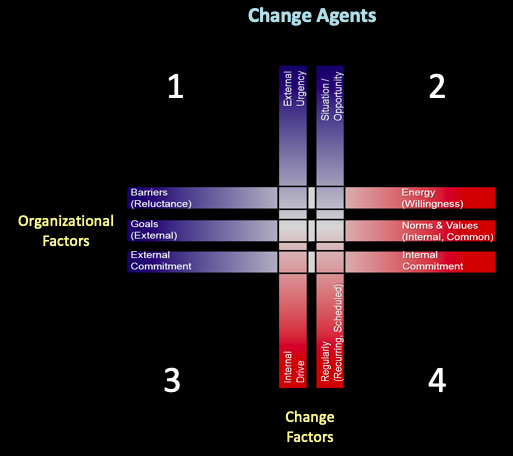
This is the first of a two-part series on the need to assess the cultural profile of an organization, and its impact on the selection of the most suitable change or transformation approach. (Part two: https://www.linkedin.com/pulse/innovation-isnt-everyone-tantra-tantraporn/ )
Most corporations define ‘Change Agents’ as those involved or effected by some planned or on-going transition. This interpretation of agents as roles is actually quite different than its original concept as factors within a structured approach designed to help managers evaluate and respond to the impact of business culture on organizational transformation. The premise was that the likelihood of successful change was dependent upon variations in the type of change being considered, and the nature of the organization being addressed.
Managers were given the means to evaluate organizational and personnel-related change factors that impacted the type of approach most likely to succeed. These factors defined the corporation’s cultural propensity or tendency to operate in certain ways, without significant regard to whether the aspect being changed was programmatic, technical, organizational or operational. A matrix was developed between three agents that assessed how warm and supportive the organization was, and two additional agents that affected perspectives on the underlying need for change.
Organizational factors used to evaluate the ‘warmth’ of an organization included;
1) resistance – are members willing to change?
2) culture – are members externally or internally motivated to change?
3) empowerment – do members feel they have the right to change on their own?
The characteristics of warm organizations were shared norms and values, members that were internally committed to act in the best interests of the organization, and the organization’s overall willingness to change.
Change-related factors that reflected the motivation and confidence of resources to address change included;
1) urgency – is the underlying need for change driven by some external requirement like a pending penalty, or an internal requirement like pride in accomplishment?
2) momentum – how comfortable and familiar are resources with changes in general?
Warm changes are internally motivated and encountered on a fairly regular basis.
The intersection of these five change agents provided the means to quickly assess and define the characteristics of four distinctly different Change Quadrant profiles. At Partisan Consulting, we generally found differences between cultural profiles at different organizational levels within the same corporation as well. The profiles and expectations of management often differed significantly from those of staff members faced with actually implementing change. These more complex profiles needed to be properly assessed, recognized and addressed in the effort to ensure successful business transformations.
The second part of this two-part series will address how to determine the transformation approach best suited to managing change within an organization based upon its profile. Specific relationships will be drawn between the organizational profile, differences between business process management (BPM), business process improvement (BPI) and business process reengineering (BPR).
Partisan Consulting is committed to providing an unparalleled level of tactical consulting services in operations management. Our proprietary tools, methods and decades of field experience allow us to quickly establish a detailed, holistic understanding of each client. We have resources available on a project or retained outsourced basis.
TOPO is a software-as-a-service, business analysis engine developed by Partisan Consulting, Ltd. Users are given the means to fully interact, understand and work within a touch-enabled environment of 3D process models, integrated operational data, facilitated analysis and auto-generated standard operating procedures. To learn more, please visit our website at www.partisanconsulting.com, or the TOPO Business Analysis Engine page on Facebook.














Send your comment to Partisan Consulting